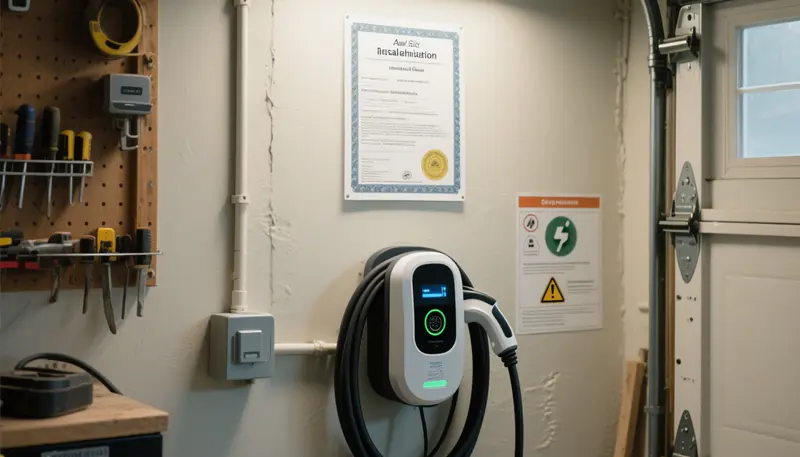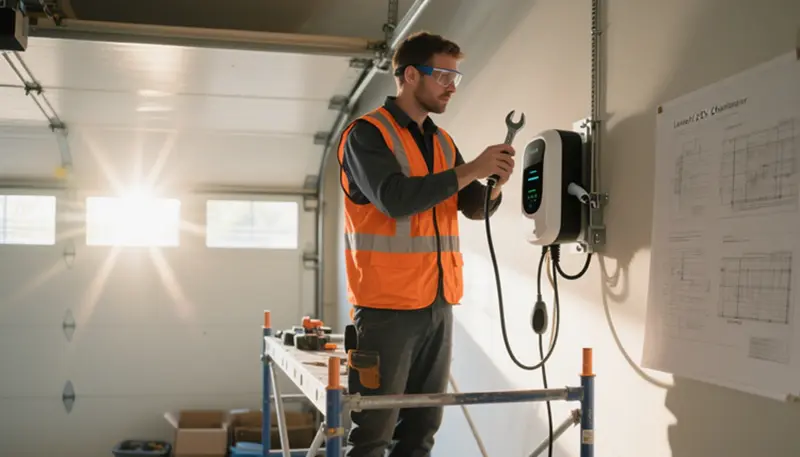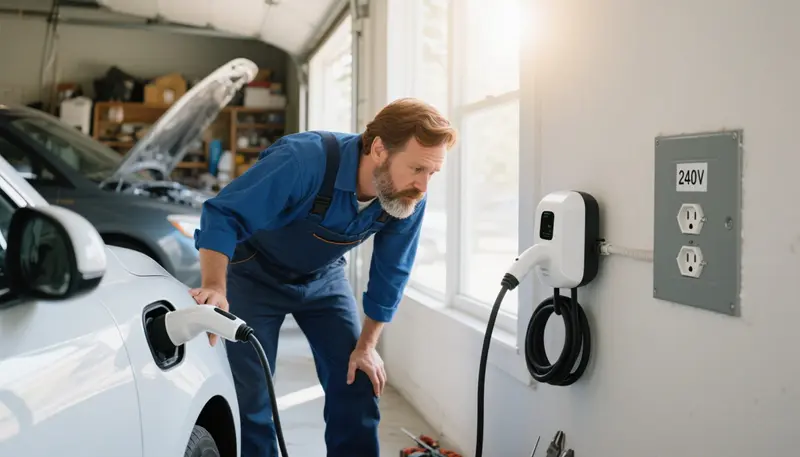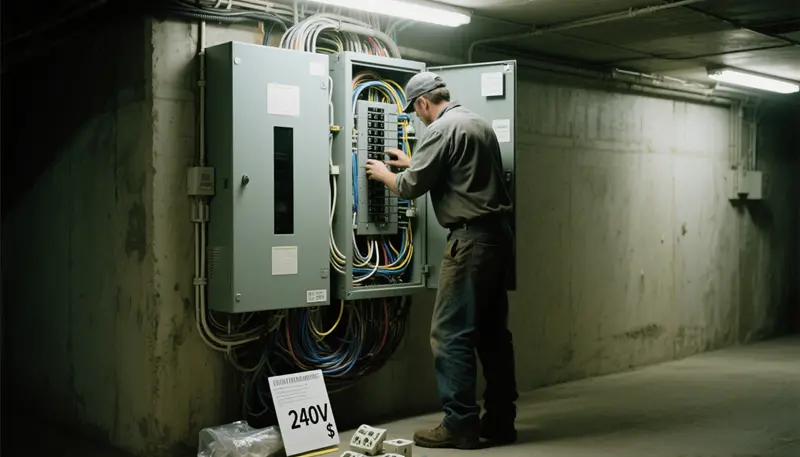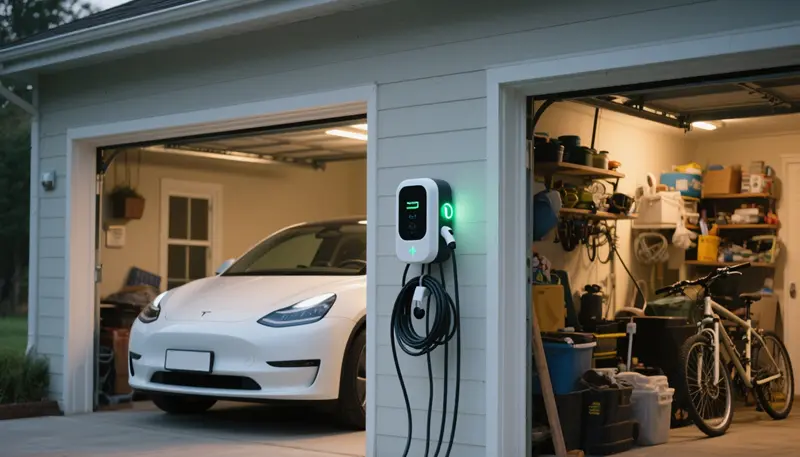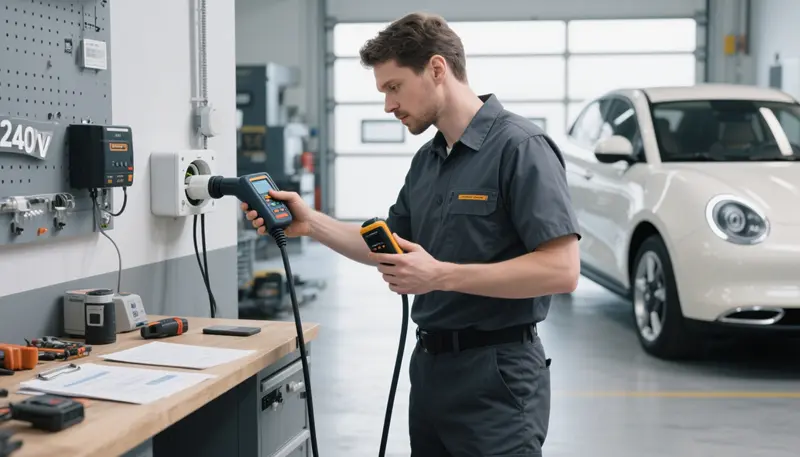Blog
Permit to Install EV Charger: Everything You Need to Know
Introduction to EV Charger Installation Permits
As electric vehicles (EVs) continue to transform transportation in the U.S. and Europe, installing a home EV charger has become a priority for many owners. A critical aspect of this process is obtaining a permit to install an EV charger, which ensures the installation meets safety and regulatory standards. But do I need a permit to install an EV charger? How much does an EV charger permit cost? This comprehensive guide addresses these questions, providing a detailed overview of the permitting process, costs, and considerations for permit for EV charger requirements. Whether you’re installing a Level 2 charger for a Tesla or a portable Level 1 unit, understanding the permit to install an EV charger is essential for a safe and compliant setup.
This article explores the necessity, costs, and steps involved in securing a permit for EV charger installation, tailored for homeowners in the U.S. and Europe. With actionable insights and expert advice, we’ll help you navigate the permitting process to ensure your EV charger installation is both safe and legal.
Why Do You Need a Permit to Install an EV Charger?
The Importance of Permits
A permit to install an EV charger is a legal requirement in most jurisdictions to ensure that electrical installations meet safety and building codes. Permits protect homeowners, their properties, and their vehicles by verifying that the installation complies with standards like the National Electrical Code (NEC) in the U.S. or the International Electrotechnical Commission (IEC) standards in Europe. Without a permit for EV charger installation, you risk:
- Safety Hazards: Improperly installed chargers can cause electrical fires, shocks, or damage to your EV’s battery.
- Fines and Penalties: Local authorities may impose fines or require you to remove non-permitted installations.
- Insurance Issues: Home insurance policies may not cover damages from unpermitted electrical work.
- Warranty Voidance: Some charger manufacturers require permitted installations to maintain warranty coverage.
Regulatory Compliance
Permits ensure that your EV charger installation adheres to local building and electrical codes, such as NEC Article 625 in the U.S., which governs EV charging systems. In Europe, compliance with IEC 61851 standards is critical. A permit to install an EV charger verifies that the installation is safe, properly grounded, and capable of handling the charger’s electrical load.
Public Safety and Community Standards
Permits also protect the broader community by ensuring that electrical upgrades don’t overload local grids or violate zoning laws. For example, outdoor installations may require additional permits to meet weatherproofing or accessibility standards, ensuring safety for all users.
By obtaining a permit for EV charger installation, you demonstrate a commitment to safety and compliance, protecting your investment and peace of mind.
Do I Need a Permit to Install an EV Charger?
When Is a Permit Required?
The question do I need a permit to install an EV charger depends on several factors, including the type of charger, installation location, and local regulations. Here’s a breakdown:
- Level 1 Chargers (120V):
- Typically plug into standard household outlets (e.g., NEMA 5-15).
- Permits are rarely required unless you’re adding a new outlet or modifying existing wiring.
- Common for portable chargers used with plug-in hybrids or low-mileage EVs.
- Level 2 Chargers (240V)e.g.,👉 FlagTools Home EV Charger:
- Require a dedicated 240V circuit (e.g., 40-50 amps) and often a new outlet (e.g., NEMA 14-50) or hardwired connection.
- Permits are almost always required due to the high-voltage wiring and potential need for panel upgrades.
- Applies to most home EV chargers, including those for Tesla, Nissan Leaf, or Ford Mustang Mach-E.
- Hardwired vs. Plug-In Chargers:
- Hardwired chargers (directly connected to the electrical system) typically require permits.
- Plug-in chargers using an existing 240V outlet (e.g., for a dryer) may not need a permit unless new wiring is added.
- Indoor vs. Outdoor Installations:
- Indoor installations (e.g., garage) often have simpler permitting requirements.
- Outdoor installations may require additional permits for weatherproofing, accessibility (e.g., ADA in the U.S.), or zoning compliance.
Regional Variations
- United States:
- Most municipalities require permits for EV charger installation, especially for 240V circuits.
- Requirements vary by state or city. For example, California’s Title 24 emphasizes energy efficiency, while rural areas may have simpler processes.
- Check with your local building department or electrician to confirm do I need a permit to install an EV charger.
- Europe:
- EU countries follow IEC standards, with permitting requirements varying by nation. For instance, Germany and the UK often require permits for 240V installations, while Norway’s streamlined processes may waive permits for simple setups.
- Local authorities or electrical safety bodies (e.g., NICEIC in the UK) oversee compliance.
Homeowners Associations (HOAs) and Rentals
- HOAs: If you live in a community with an HOA, you may need approval in addition to a permit to install an EV charger. HOAs may restrict outdoor installations or require aesthetic compliance.
- Rentals: Tenants may need landlord permission and a permit for EV charger if modifying the property’s electrical system.
In most cases, a permit to install an EV charger is required for Level 2 installations, and it’s best to consult a licensed electrician to confirm local requirements.
EV Charger Permit Cost: What to Expect
Typical Cost Range
The EV charger permit cost typically ranges from $50 to $200, depending on the jurisdiction and installation complexity. Here’s a breakdown:
- Basic Permits: $50-$100 for simple Level 2 installations (e.g., adding a 240V outlet in a garage).
- Complex Permits: $100-$200 for installations requiring panel upgrades, outdoor setups, or multiple chargers.
- Inspection Fees: Some areas charge separate fees ($50-$150) for post-installation inspections to verify code compliance.
Factors Influencing Permit Costs
Location:
- U.S.: Urban areas like San Francisco or New York charge higher fees ($100-$200) than rural areas ($50-$100).
- Europe: Countries like Germany (€80-€150) and the UK (£50-£120) have higher fees than Eastern Europe (€30-€80).
Installation Complexity:
- Adding a single 240V outlet requires a basic electrical permit.
- Upgrading an electrical panel or installing multiple chargers may require additional permits or engineering reviews, increasing costs.
Local Regulations:
- Some municipalities bundle permit and inspection fees, while others charge separately.
- Areas with strict energy efficiency standards (e.g., California, Netherlands) may require additional documentation, raising costs.
Electrician Services:
- Many electricians include EV charger permit cost in their quotes, handling the application process for you.
- If you apply independently, you may save $20-$50 but spend time navigating local bureaucracy.
Cost-Saving Tips
- Work with Your Electrician: Most electricians are familiar with local permitting processes and can streamline applications, reducing errors or delays.
- Batch Permits: If installing multiple chargers (e.g., in a multi-family building), apply for permits together to reduce per-unit costs.
- Check Exemptions: Some rural areas or specific charger types (e.g., Level 1 using existing outlets) may not require permits, saving costs.
- Leverage Incentives: Some regions offset EV charger permit cost through rebates or tax credits (e.g., U.S. federal tax credit, UK’s EVHS grant).
Understanding the EV charger permit cost and planning ahead can help you budget effectively for your permit to install an EV charger.
How to Apply for a Permit to Install an EV Charger
Step-by-Step Process
Securing a permit for EV charger installation is straightforward when you follow these steps:
Research Local Requirements:
- Contact your local building department or check their website for EV charger permit requirements.
- In the U.S., search for your city’s permitting portal (e.g., “Los Angeles building permits”).
- In Europe, consult local authorities or electrical safety bodies (e.g., NICEIC in the UK, VDE in Germany).
Prepare Documentation:
- Electrical Plan: Include details of the charger, circuit (e.g., 40-50 amps), and outlet type (e.g., NEMA 14-50).
- Charger Specifications: Provide the manufacturer’s specs (e.g., ChargePoint, Tesla Wall Connector) to confirm compliance.
- Site Plan: Show the charger’s location (e.g., garage, driveway) and proximity to the electrical panel.
Hire a Licensed Electrician:
- Most electricians handle the permitting process as part of EV charger installation, submitting plans and coordinating inspections.
- Ensure your electrician is licensed and familiar with NEC Article 625 or IEC 61851 standards.
Submit the Permit Application:
- Applications can often be submitted online or in person at the building department.
- Include the electrical plan, charger specs, and any HOA approvals (if applicable).
- Pay the EV charger permit cost ($50-$200).
Schedule Installation:
- Once the permit to install an EV charger is approved, your electrician can begin work.
- Typical installation includes running a 240V circuit, installing a breaker, and mounting the outlet or charger.
Arrange Inspection:
- After installation, a local inspector will verify compliance with electrical and building codes.
- Ensure the charger is properly grounded, wired, and safe for operation.
- Inspections typically occur within 1-5 days of installation.
Final Approval:
- Once approved, you’ll receive a permit certificate, and your charger is ready for use.
- Retain permit documentation for insurance or warranty purposes.
Role of Your Electrician
A licensed electrician is critical for permit to install EV charger success:
- They prepare and submit accurate electrical plans, reducing the risk of permit rejection.
- They ensure compliance with local codes, such as NEC Article 625 or IEC standards.
- They coordinate inspections, saving you time and hassle.
Regional Examples
- U.S. (California): Los Angeles requires an electrical permit ($75-$150) and a post-installation inspection. The electrician submits plans via the LADBS online portal.
- Europe (UK): The NICEIC oversees EV charger installations, requiring a permit (£50-£100) and compliance with BS 7671 wiring regulations.
- Germany: Permits are managed by local authorities, with costs (€80-€150) varying by city. VDE standards ensure safety.
By working with a professional and understanding local requirements, securing a permit for EV charger installation is a seamless process.
Common Permitting Issues and Considerations
Homeowners Associations (HOAs)
- Restrictions: Some HOAs restrict EV charger installation, especially for outdoor or visible setups. Check your HOA’s rules before applying for a permit to install an EV charger.
- Solutions: Provide documentation on the environmental and property value benefits of EV chargers. Some states (e.g., California) have laws protecting homeowners’ rights to install chargers.
Historical or Protected Buildings
- Challenges: Properties in historical districts may face stricter permitting requirements, requiring approval from preservation boards.
- Solutions: Work with your electrician to design a discreet installation (e.g., indoor charger) to meet aesthetic standards.
Outdoor Installations
- Additional Permits: Outdoor EV charger installations may require zoning or environmental permits, especially in flood-prone areas.
- Weatherproofing: Use NEMA 3R or IP65 enclosures to comply with codes, increasing the EV charger permit cost slightly.
Multi-Family Buildings
- Shared Electrical Systems: Apartment complexes may require additional permits for panel upgrades or shared charger installations.
- Coordination: Work with property managers to secure a permit for EV charger and allocate costs among residents.
Safety Standards
- NEC Article 625 (U.S.): Governs EV charging systems, requiring proper grounding, circuit protection, and equipment certification.
- IEC 61851 (Europe): Ensures chargers meet safety and performance standards.
- GFCI Requirements: Some jurisdictions require ground-fault circuit interrupter (GFCI) breakers, adding $50-$100 to costs.
Addressing these considerations early can prevent delays and ensure a smooth permit to install EV charger process.
Frequently Asked Questions (FAQ)
Q: Do I need a permit to install an home EV charger?
A: Yes, most jurisdictions require a permit to install an EV charger for Level 2 (240V) installations due to high-voltage wiring. Level 1 chargers using existing outlets typically don’t need permits. Check with your local building department to confirm.
Q: How much is the EV charger permit cost?
A: The EV charger permit cost ranges from $50-$200, depending on the location and installation complexity. Additional inspection fees may apply ($50-$150).
Q: How long does it take to get a permit for an EV charger?
A: Permit approval typically takes 1-7 days, depending on the jurisdiction. Inspections occur within 1-5 days post-installation.
Q: Can I install an EV charger without a permit?
A: Installing without a permit for EV charger risks fines, insurance issues, or safety hazards. Always consult your electrician and local authorities.
Q: Does a Tesla charger require a special permit?
A: No, the permit to install an EV charger for a Tesla (e.g., Wall Connector or Mobile Connector) follows the same process as other Level 2 chargers(e.g.,👉 FlagTools Home EV Charger), costing $50-$200.
Q: Who applies for the permit to install an EV charger?
A: Your licensed electrician typically handles the permit for EV charger application, submitting plans and coordinating inspections. You can apply independently, but it’s less common.
Conclusion: Secure Your Permit to Install an EV Charger
Obtaining a permit to install an EV charger is a critical step in ensuring a safe, compliant, and efficient EV charging setup. By understanding whether you need a permit, budgeting for the EV charger permit cost, and working with a licensed electrician, you can navigate the process with confidence. Permits protect your home, vehicle, and community while ensuring compliance with local codes, making them a small but essential part of EV charger installation.
Call to Action: Ready to install your EV charger? Contact a licensed electrician to assess your needs and secure a permit for EV charger installation. Check with your local building department or utility for incentives to offset the EV charger permit cost and start charging safely today!



